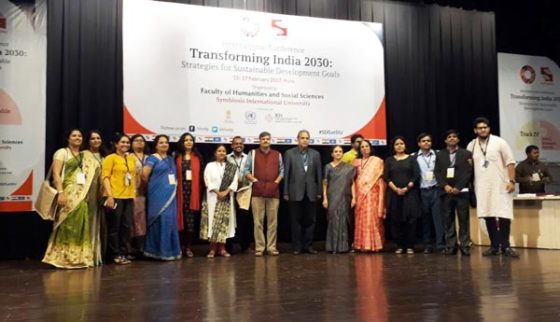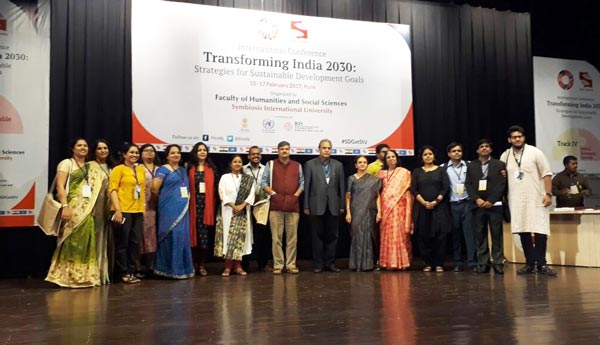
Symbiosis International University’s, Faculty of Humanities and Social Sciences (FoHSS) announces an International Conference on, “TRANSFORMING INDIA 2030: STRATEGIES FOR SUSTAINABLE DEVELOPMENT GOALS” starting from 15-17th February 2017. The conference is scheduled for three days and will be inaugurated on February 15th, 2017 at 6:00 PM at Viswabhavan Auditorium, Symbiosis Campus, S.B. Road.
The inaugural ceremony will be graced by Mr. Yuri Afanasiev, UN Resident Coordinator & UNDP Resident Representative in India; Prof. Sukhadeo Thorat, Chairman, Indian Council of Social Science Research and Prof. Dilip Nachne, Professor Emeritus, Indira Gandhi Institute of Development Research & Member, Prime Minister’s Economic Advisory Council.
Speaking on the occasion Dr. Vidya Yeravdekar, Principal Director, Symbiosis Society, said, “We at Symbiosis International University are extremely proud to host this international conference at our campus. It is our endeavor to give our students and the people attending the conference, an opportunity to meet and discuss on sustainability with eminent people across the globe. The two day conference will focus on formulating a strategy for sustainable development. The outcome of this conference will be taken up as a pilot in Pune district by submitting the policy papers to the UN and NITI Aayog to take it to the next level.
The United Nations Information Centre (UNIC) for India & Bhutan, NITI Aayog – a premier think tank of the Government of India and Research and Information System for Developing Countries (RIS) – an autonomous think-tank under the Ministry of External Affairs, are the academic partners for this conference.
On 16th & 17th February 2017, the conference will be held at the Symbiosis University campus in Lavale from 11:00 AM to 5:30 PM. Eminent speakers like Prof. TCA Anant, Chief Statistician of India, Dr. Andreas Bauer, Senior Resident Representative of IMF; Dr. Vanesa Broto, Senior Lecturer, Faculty of Built Environment, UCL; among many others will impart knowledge and share their experiences at this symposium.
The event will witness a large international community comprising of UN officials, government officials, members of the academia, civil society organisations and students.
Transforming India 2030 will focus on select goals in five tracks of the 17 SDGs devised by the United Nations, as follows:
Track 1 – Poverty and Inequality (Goal 1 & Goal 10)
Track 2 – Education & Gender (Goal 4 & Goal 5)
Track 3 – Sustainable Cities (Goal 11)
Track 4 – Jobs and Economic Growth (Goal 8)
Track 5 – Partnerships for the Goals (Goal 17)
On the announcement, Dr. Jyoti Chandiramani, Dean, Faculty of Humanities and Social Sciences at the university and convenor of the conference said “The Conference is a continuation of our endeavor at the University towards providing quality education through international understanding. It is the efforts of the Faculty of Humanities and Social Sciences (FOHSS), the conference organizers and hosts, to work towards achieving a multiplier effect with respect to the dissemination and also mapping of India’s existing policy framework and ongoing affirmative measures pertaining to the Sustainable Development Goals”.
“The discussions and discourse at the conference would attempt to bring out of the box strategies, providing the deserving attention to issues related to people, planet, prosperity, and partnerships. With a presence of large number of students across continents and pan-India at SIU, and the various stakeholders attending the conference, I am sure the outcomes of the deliberations and discussions will result in national as well as global footprints.” said Prof. Chandiramani
Background of the conference
At the dawn of the millennium, leaders of 189 countries signed the Millennium Declaration in September 2000. It committed to achieving a set of goals known as the Millennium Development Goals (MDGs) by the year 2015. Having achieved considerable success on MDGs, a new development mantra for the world was developed by the UN after one of the biggest consultation process in the history of UN. 17 goals were identified as the Sustainable Development Goals and was unanimously adopted by 193 member states of the UN in September 2015. If MDGs aimed at reducing the global evils of poverty, illiteracy, preventable deaths etc., SDGs aim to finish the job.
For Symbiosis, the release of SDGs was also a pleasant realisation that the university was offering programmes which mapped with the 17 goals. SDGs are a crucial mantra that will shape the thought and discourse on development in the years to come. Understanding the criticality of SDGs, SIU’s conference is a platform for deliberation, constructive criticism and evolution of strategies to achieve SDGs.






